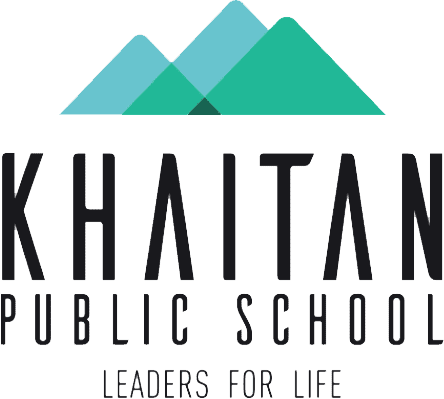What’s the Best Time to Study for Class 10th Students?
As the head of academic research and student performance at Khaitan Public School, I’ve dedicated my career to deciphering the intricate science of learning. Parents and students from Class 10, a pivotal and often stressful year, frequently approach me with one pressing question: “What is the absolute best time to study for maximum results?”
My answer, grounded in years of educational psychology and our own performance data, is a departure from the traditional search for a single magic hour. The most effective approach is deeply individualized, contingent upon a student’s unique biological clock, or chronotype.
In this definitive guide, I will not offer you a rigid, one-size-fits-all timetable. Such directives often fail because they ignore the fundamental biological reality of the adolescent brain. Instead, I will illuminate the evidence-based framework we champion at Khaitan. We will move beyond simply managing time and delve into managing your energy, focus, and well-being to unlock your true academic potential. This is not about just working harder; it is about working in harmony with your own biology.
Part 1: The Morning Cognitive Window (Approximately 5 AM – 9 AM)
Think of the early morning as a period of profound neurological opportunity. After a full night of restorative sleep, the brain is, in essence, a pristine, fully charged battery, ready to power through the most complex problems. We at Khaitan refer to this not just as “morning,” but as the Prime Cognitive Window.
The Neuro-Scientific Basis for Morning Alertness
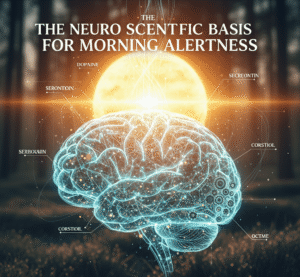
This feeling of peak alertness is a well-documented biological event. Your body operates on an internal 24-hour clock known as the circadian rhythm, which governs everything from hormone release to cognitive function. This rhythm is synchronized by external cues called “zeitgebers,” the most powerful of which is natural light.
Upon waking, your body experiences the Cortisol Awakening Response (CAR). This natural surge of cortisol acts as a powerful stimulant, heightening alertness and priming the hippocampus—the brain’s learning and memory center—for the acquisition of new information. This makes the morning an ideal time for tackling new theories, grappling with complex concepts in Physics or Mathematics, and engaging in deep learning.
Advantages We’ve Observed in Morning Learners
Pristine Brain Function: Your mind is uncluttered by the day’s events. This mental silence is the ideal environment for deep focus on new or difficult material.
Peak Willpower Reserves: Willpower is a finite resource that depletes throughout the day. By tackling your most challenging subject first, you apply your maximum willpower when it’s at its natural, unrestrained peak.
A Positive Psychological Feedback Loop: Successfully mastering a difficult topic early in the day creates a powerful feeling of accomplishment and control. Our research shows this fosters greater self-discipline and a proactive mindset that positively influences all subsequent learning endeavors for the day.
Strategic Daily Planning: An early study session provides a significant strategic advantage, allowing you the rest of the day to reinforce learning, clarify doubts with teachers, and handle less demanding tasks without feeling rushed.
Considerations and a Word of Caution
The primary objective is to arrive at school feeling refreshed and prepared, not mentally exhausted. The efficacy of morning study hinges entirely on individual alignment. It is most advantageous only if you are a natural early riser and can achieve it without sacrificing the essential 8-10 hours of sleep.
The Khaitan Pre-Study Ritual for Mornings
Hydrate and Fuel: Begin with a glass of water to rehydrate the brain. Follow with a light, protein-rich snack like almonds or yogurt to provide sustained energy without the sluggishness of a heavy meal.
Target the ‘Monster’ Subject: Identify your most challenging subject and dedicate this high-energy window to it.
The 5-Minute Consolidation: After your study block, spend five minutes writing down the key concepts you’ve just learned without looking at your notes. This act of “active recall” begins cementing the information in your memory immediately.
Part 2: The Afternoon Application & Integration Window (Approximately 2 PM – 5 PM)
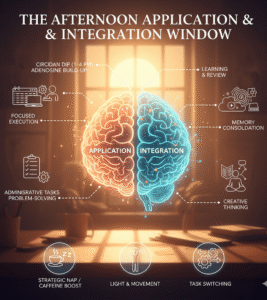
While some experience a brief “post-lunch dip,” the afternoon is generally a period of rising cognitive ability, particularly for tasks requiring analytical thought and the integration of knowledge. This is not a time for low energy, but for a different type of high performance.
This window is your brain’s prime time for making connections. It demonstrates remarkable efficiency in processing and integrating new information acquired earlier in the day. The afternoon is therefore exceptionally well-suited for:
Consolidating Knowledge: Reviewing notes from your morning classes is highly effective now, as the information is still fresh.
Analytical Thinking & Problem-Solving: Use this time for solving complex problem sets in Math or Science, writing essays that require synthesizing multiple sources, or any task that involves connecting previously learned material with new information.
Collaborative Learning: Energy levels are generally higher across the population in the morning, making it an ideal time for productive homework groups or clarifying doubts with teachers and peers.
At Khaitan, we encourage students to see their study schedule not as uniform blocks of time, but as a dynamic plan that leverages their fluctuating cognitive strengths. Use the morning for absorption and the afternoon for application and integration.
Part 3: The Evening Focus & Consolidation Window (Approximately 8 PM onwards)
For students who are natural “night owls”—a biological predisposition for a significant portion of adolescents—the evening hours can offer a sanctuary of quiet, uninterrupted focus. With the day’s distractions diminished, many find they can achieve a state of deep concentration.
The evening is also reported by many students to be a period of enhanced creative thinking. The relaxed atmosphere can foster innovative thought, making it an opportune time for brainstorming, essay writing, or tackling problems that require a creative approach.
The Critical Paradox: When Night Study Backfires
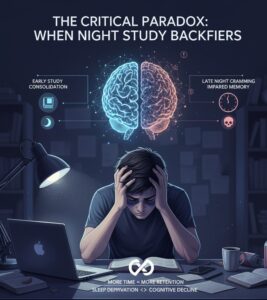
Perhaps the most cited benefit of evening study is its potential to improve memory consolidation. Research confirms that studying new information shortly before sleep can enhance its recall. During sleep, the brain actively processes and transfers this information to long-term memory.
However, this creates a critical paradox that we emphasize strongly at Khaitan. This memory benefit is entirely contingent upon receiving a full 8-10 hours of subsequent, high-quality sleep.
If late-night studying encroaches upon this essential sleep window, the severe negative consequences of sleep deprivation—including impaired memory, reduced focus, diminished problem-solving abilities, and adverse mental health effects—will inevitably and completely outweigh any potential gains in information retention. Sacrificing sleep for study is not a trade-off; it is a net loss for your academic performance and your well-being.
The optimal window for night study is therefore narrow, demanding the discipline to conclude your session and begin your wind-down routine well before your designated bedtime.
Part 4: Beyond the Clock: The Non-Negotiable Pillars of Academic Success
The search for an optimal study time is important, but it is only one piece of a larger puzzle. At Khaitan Public School, we build our academic programs upon a foundation of holistic well-being. The following pillars are not optional extras; they are prerequisites for effective learning.
Pillar 1: The Primacy of Sleep
Sleep is not a passive activity; it is an active and critical phase of learning. For a Class 10 student, 8-10 hours of quality sleep per night is non-negotiable. During sleep, your brain repairs neurons, conserves energy, and, most importantly, consolidates memory. Any study schedule that compromises this is fundamentally flawed. Chronic sleep deprivation is directly linked to decreased academic performance, impaired judgment, and a higher risk of anxiety and depression.
Pillar 2: The Power of Strategic Breaks
Continuous study leads to mental fatigue and a sharp decline in concentration. Research shows that focus wanes significantly after 90 minutes on a single task. We strongly advocate for structured break systems. The Pomodoro Technique, for instance—25 minutes of focused study followed by a 5-minute break—is highly effective at keeping the mind fresh and preventing burnout.
Pillar 3: The Conducive Study Environment
A dedicated, clean, and organized study space with good lighting is paramount. More importantly, it must be distraction-free. This means silencing your phone and using website blockers during study sessions. Establishing a consistent time and place for study helps build powerful habits, reducing the cognitive energy wasted on deciding where and when to begin.
Pillar 4: Holistic Well-being in the High-Pressure Class 10 Context
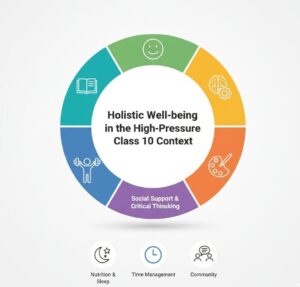
We are acutely aware of the immense academic pressure our Class 10 students face, stemming from board examinations, competitive entrance tests, and significant societal expectations. This high-stakes environment, intensified by the coaching institute culture, often forces students to sacrifice their sleep, hobbies, and mental peace.
Let me be unequivocal: Neglecting your well-being directly undermines your academic potential. A balanced lifestyle is not a distraction from your studies; it is a foundational component of a successful academic strategy.
Regular Physical Activity: Enhances concentration and is one of the most effective stress-reduction tools available.
Pursuing Hobbies: Vital for alleviating stress, fostering creativity, and providing a necessary mental escape.
Balanced Diet and Hydration: Fundamental for supporting focus and sustained energy.
Open Communication: Fostering an environment at home and school where you can openly discuss your concerns is crucial for your mental health.
Part 5: The KPS Strategic Academic Plan: Your 7-Day Self-Audit
Now, it is time to become a researcher of your own habits. At Khaitan, we guide every student through this structured self-audit to discover their personal academic blueprint. For one week, diligently track your focus and energy using a simple log.
My Personal Cognitive Performance Log
| Date & Time Slot | Subject & Task Type (New/Revision/Practice) | Focus Level (1-10) | Energy Level (Low/Med/High) |
| Mon 7-8 AM | Physics – New Chapter | 9/10 | High |
| Mon 3-4 PM | History – Homework | 5/10 | Low |
| Mon 9-10 PM | Chemistry – Revision | 8/10 | Medium |
At the end of the week, analyze your data. The time slots where you consistently logged high focus levels (8-10) are your Golden Hours. These are for your most challenging tasks. The slots with medium focus (5-7) are your Silver Hours, perfect for revision and practice. This data-driven, personalized timetable is infinitely more effective than any generic schedule.
Final Words: A Message from Your Research Teacher
The journey through Class 10 is a marathon, not a sprint. It is a year where you learn not just a syllabus, but also the very nature of how you learn best. The pressure is undeniable, but the path to success does not have to be one of grueling, joyless effort that compromises your health.
Especially during adolescence, there is a natural biological tendency to be a “night owl.” This often creates a significant mismatch with traditional early-morning school schedules, leading to chronic sleep debt. Acknowledge this. Do not fault yourself for struggling with a system that may be misaligned with your innate biology.
Instead, take control. Focus on what you can influence: a personalized schedule built upon the non-negotiable foundation of sleep and holistic well-being. By becoming an expert on yourself and aligning your efforts with your energy, you will not only improve your marks but will also cultivate a resilient, healthy, and sustainable approach to learning that will serve you throughout your life.
